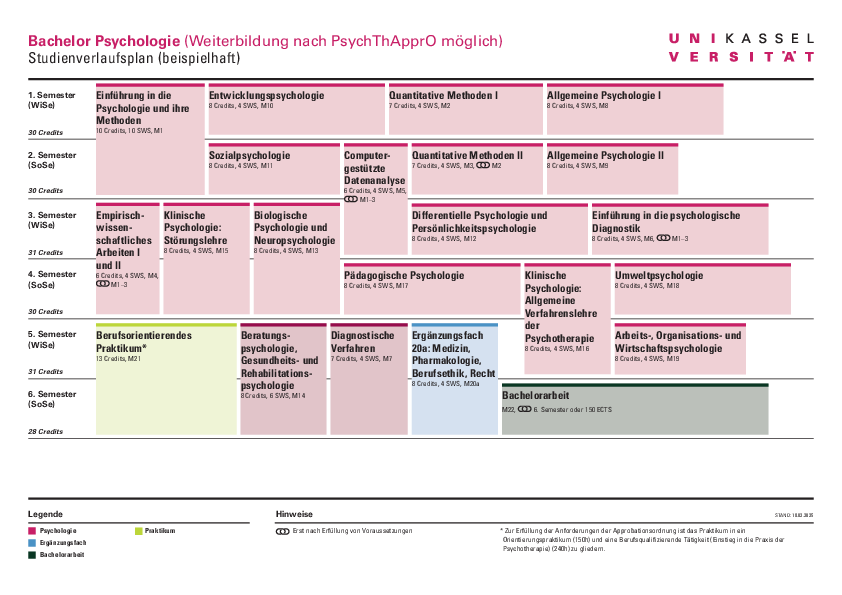How is the course structured?
This page contains automatically translated content.
The Bachelor's degree course in Psychology is modularized and consists of 22 modules (including Module 20 Supplementary Subject and Module 21 Career-Oriented Internship). The courses are based on the fundamentals and fields of application of psychology.
After an introduction to the systematics and methods of psychology and the basic subjects, an overview of the fields of application of psychology is provided. In-depth modules are included in the further course of study, as well as the Bachelor's thesis at the end of the program. From the 5th semester onwards, a career-oriented internship is planned to provide an insight into practical activities.
Sample study plans
Study plan for the career goal of psychotherapist
Download
Study plan for other career goals
Download
Each of the 22 modules is associated with a certain amount ofwork (workload). 1 credit corresponds to a workload of approx. 30 hours. The entire Bachelor's program comprises 180 credits.
Active participation in the courses as (ungraded) coursework is just as relevant for passing the module as the (graded) examinations. Examinations usually take the form of written examinations, term papers or oral examinations. Ungraded coursework includes, for example Preparation of minutes, presentations, seminar presentations.
Further information
The module coordinator will inform you about courses offered in the supplementary subject before the start of the respective semester. Here you will find the current offer: for the winter semester 2025/26.
The credits completed there must be certified by the respective lecturer(form) and submitted to the examination office (IfP, Ms. Braun).
Please note the information on this module in the examination regulations/module handbook. In most degree programs, two courses must be attended (see module descriptions). In one of the two courses, you must complete a course assignment and in the other a graded examination. The examination results in the final module grade. Check the module description to see which types of courses may be attended. In other degree programs, it is sometimes common that graded examinations can also be taken in seminars; please enquire about the modalities with the respective lecturers in advance.
Please note: If you are aiming for a clinical Master's degree with a license to practice medicine, you must take Module 20a "Medicine, Pharmacology, Professional Ethics, Professional Law"!
For courses in the field of sports science or sociology, please contact the study coordination office, as there are participant restrictions.
Please note that credits earned in other subject areas are assessed as 8 credits in the Psychology degree program, even if the actual number of credits earned is higher.
You can find information about the internship here
Information on registration and the procedure can be found here.
| Module no. | Module name | Person responsible for module | |
|---|---|---|---|
| 1 | Introduction to psychology and its methods | Ralf Rummer | |
| 2 | Quantitative Methods I | Florian Scharf | |
| 3 | Quantitative Methods II | Florian Scharf | |
| 4 | Empirical-scientific work | Ralf Rummer | |
| 5 | Computer-aided data analysis | Johannes Zimmermann | |
| 6 | Introduction to psychological diagnostics | Ulrich Schroeders | |
| 7 | Diagnostic procedures | Ulrich Schroeders | |
| 8 | General Psychology I | Ralf Rummer | |
| 9 | General Psychology II | Ralf Rummer | |
| 10 | Developmental Psychology | Mirjam Ebersbach | |
| 11 | Social Psychology | Marc Reinhard | |
| 12 | Differential psychology and personality psychology | Johannes Zimmermann | |
| 13 | Biological psychology and neuropsychology | Sarah Glim | |
| 14 | Counseling Psychology, Health and Rehabilitation Psychology | Heidi Möller | |
| 15 | Clinical psychology - disorders | Cord Benecke | |
| 16 | Clinical Psychology - General Procedures | Cord Benecke | |
| 17 | Educational Psychology | Martin Hänze | |
| 18 | Environmental Psychology | Andreas Ernst | |
| 19 | Industrial, organizational and business psychology | Oliver Sträter, Sandra Ohly | |
| 20 | Supplementary subject | Priscilla Achaa-Amankwaa | |
| a | Medicine, pharmacology, professional ethics, professional law | Heidi Möller | |
| b | Sociology | Kerstin Jürgens | |
| c | Political Science | Sabine Ruß-Satter | |
| d | Philosophy | Dirk Stederoth | |
| e | Biology | Langer, Weising, Gutekunst | |
| f | Economics | Peter Eberl, Jan Marco Leimeister | |
| g | Arts and Humanities | Kai-Uwe Hemken, Martina Sitt | |
| h | Human-machine systems | Ludger Schmidt | |
| i | Cognitive Sciences Linguistics | Holden Härtl | |
| j | Sports Science | Norbert Hagemann, Armin Kibele | |
| k | Musicology | Jan Hemming | |
| 21 | Career-oriented internship | Internship office (praktikum.psychologie[at]uni-kassel[dot]de) | |
| 22 | Bachelor thesis | Supervisor |

